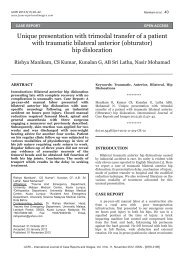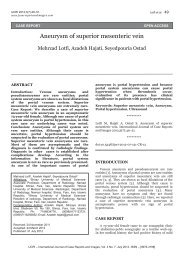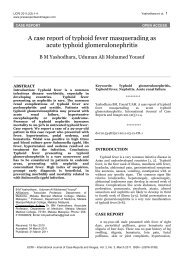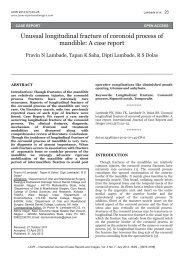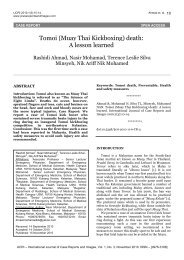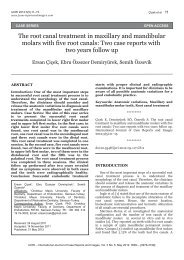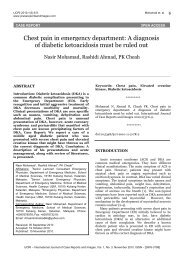Sanju George - International Journal of Case Reports and Images ...
Sanju George - International Journal of Case Reports and Images ...
Sanju George - International Journal of Case Reports and Images ...
Create successful ePaper yourself
Turn your PDF publications into a flip-book with our unique Google optimized e-Paper software.
IJCRI 2010;1(3):1-5.<br />
www.ijcasereports<strong>and</strong>images.com<br />
<strong>George</strong> et. al.<br />
1<br />
CASE REPORT<br />
OPEN ACCESS<br />
My name is Luke <strong>and</strong> I am a gambling addict<br />
<strong>Sanju</strong> <strong>George</strong>, Ijeoma Onuba<br />
ABSTRACT<br />
Introduction: Gambling addiction <strong>and</strong> its<br />
associated problems, <strong>of</strong>ten go unrecognized<br />
<strong>and</strong> unaddressed in most health care settings,<br />
with resultant adverse consequences to the<br />
individual, family <strong>and</strong> society. <strong>Case</strong> Report:<br />
Here we present a patient’s own account <strong>of</strong> his<br />
gambling addiction. Conclusion: Through this<br />
report, we aim to raise non-specialists’<br />
awareness <strong>of</strong> gambling addiction, <strong>and</strong> also<br />
hope to equip them with basic knowledge in the<br />
screening, assessment <strong>and</strong> treatment <strong>of</strong><br />
gambling addiction.<br />
Keywords: Gambling, Addiction, Heroin<br />
addiction, Screening, Assessment, Treatment<br />
*********<br />
<strong>George</strong> S, Onuba I. My name is Luke <strong>and</strong> I am a<br />
gambling addict. <strong>International</strong> <strong>Journal</strong> <strong>of</strong> <strong>Case</strong> <strong>Reports</strong><br />
<strong>and</strong> <strong>Images</strong> 2010;1(3):1-5.<br />
*********<br />
<strong>Sanju</strong> <strong>George</strong> 1 , Ijeoma Onuba 2<br />
Affiliations: 1 Consultant <strong>and</strong> Senior Research Fellow in<br />
addiction psychiatry, Birmingham <strong>and</strong> Solihull Mental<br />
Health NHS Trust, Birmingham, B37 7UR, Engl<strong>and</strong>.<br />
2 Specialist doctor in addiction psychiatry, Birmingham<br />
<strong>and</strong> Solihull Mental Health NHS Trust, Birmingham, B37<br />
7UR, Engl<strong>and</strong>.<br />
Corresponding Author: Dr. <strong>Sanju</strong> <strong>George</strong>, Consultant<br />
<strong>and</strong> Senior Research Fellow in addiction psychiatry,<br />
Birmingham <strong>and</strong> Solihull Mental Health NHS Trust,<br />
Birmingham, B37 7UR, Engl<strong>and</strong>. Phone: +0044<br />
1216784900, Fax: +0044 212 6784901, Email:<br />
<strong>Sanju</strong>.<strong>George</strong>@bsmhft.nhs.uk<br />
Received: 11 August 2010<br />
Accepted: 26 September 2010<br />
Published: 15 November 2010<br />
doi:10.5348/ijcri-2010-11-4-CR-1<br />
INTRODUCTION<br />
Gambling, wagering something <strong>of</strong> value on an event<br />
whose outcome is determined by chance, is a very<br />
common leisure activity in most cultures. For the vast<br />
majority, gambling remains a past time but for a<br />
minority it can progress to problematic gambling or<br />
even gambling addiction.<br />
The British Gambling Prevalence Survey [1] (2007)<br />
showed that nearly 70% <strong>of</strong> adults had gambled in the<br />
past 12 months <strong>and</strong> that the most popular gambling<br />
activities were National lottery (57%), scratch cards<br />
(20%), betting on horse races (17%) <strong>and</strong> fruit/slot<br />
machines (14%). Gambling cuts across age, gender,<br />
class <strong>and</strong> race. The British Gambling Prevalence<br />
Survey (BGPS) also found the prevalence <strong>of</strong> problem<br />
gambling (defined as gambling that disrupts or<br />
damages personal, family or recreational pursuits) to<br />
be around 0.6%, with a further 6.5% found to be at risk<br />
<strong>of</strong> developing problem gambling in future. This<br />
prevalence figure is slightly lower than found in most<br />
international studies where it is between 1 <strong>and</strong> 3% [2].<br />
Problem gambling is more common in patients with<br />
comorbid psychiatric disorders <strong>and</strong> in those with<br />
medical problems: studies showing prevalence rates in<br />
primary care attendees <strong>of</strong> 6% [3] <strong>and</strong> between 10% <strong>and</strong><br />
15% in substance misusing populations [4].<br />
Although there exist some nosological <strong>and</strong><br />
conceptual ambiguity as to whether problem gambling<br />
is an addictive, impulse control or obsessivecompulsive<br />
disorder, from an assessment <strong>and</strong><br />
treatment viewpoint, it is perhaps best conceptualized<br />
as an addiction. And so just like substance use,<br />
gambling behaviours too exist on a scale <strong>of</strong> escalating<br />
severity, ranging from normal/recreational gambling,<br />
through problem gambling to gambling addiction.<br />
There is some consensus regarding the definitions <strong>of</strong><br />
problem <strong>and</strong> pathological gambling: Problem gambling<br />
is defined as gambling that disrupts or damages<br />
IJCRI – <strong>International</strong> <strong>Journal</strong> <strong>of</strong> <strong>Case</strong> <strong>Reports</strong> <strong>and</strong> <strong>Images</strong>, Vol. 1, No. 3, Novemberr 2010. ISSN – [0976-3198]
IJCRI 2010;1(3):1-5.<br />
www.ijcasereports<strong>and</strong>images.com<br />
<strong>George</strong> et. al.<br />
2<br />
personal, family or recreational pursuits; <strong>and</strong><br />
pathological gambling (or gambling addiction) is<br />
defined as persistent <strong>and</strong> recurrent maladaptive<br />
gambling behaviour, characterized by some <strong>of</strong> the<br />
following: preoccupation with gambling, need to<br />
gamble with increasing amounts, inability to cut back<br />
or stop, 'chasing' losses, lying about gambling, adverse<br />
social <strong>and</strong> financial consequences, etc [5].<br />
Gambling addiction can negatively impact on the<br />
individual, family <strong>and</strong> society. Physical ill health [6]<br />
(such as gastrointestinal symptoms, cardiovascular<br />
symptoms <strong>and</strong> psychosomatic symptoms) <strong>and</strong><br />
psychiatric comorbidity [7] are common. Depression<br />
has been noted in up to 50% <strong>of</strong> gambling addicts;<br />
anxiety-spectrum disorders, substance misuse <strong>and</strong><br />
personality disorders are also very common.<br />
Psychiatric comorbidity in gambling addicts is <strong>of</strong>ten<br />
bidirectional. Excessive gambling can affect addicts’<br />
finances leading to debts, bankruptcy, job losses <strong>and</strong><br />
relationship breakdowns. Some addicts commit crime<br />
to feed their habit. It is further estimated that for every<br />
gambling addict between 8 <strong>and</strong> 10 others (including<br />
family, friends <strong>and</strong> colleagues) are also negatively<br />
affected [8]. Spousal violence, <strong>and</strong> children <strong>of</strong><br />
gamblers manifesting substance misuse, emotional<br />
<strong>and</strong> behavioural difficulties are also common [9].<br />
Despite all the above, sadly, gambling – related<br />
problems <strong>of</strong>ten go undetected <strong>and</strong> unaddressed,<br />
thereby burdening the individual <strong>and</strong> others. Various<br />
reasons have been given for problem gamblers<br />
remaining ‘hidden’: problem gamblers are reluctant<br />
help seekers <strong>and</strong> even when they do their<br />
presentations are seldom obviously attributable to<br />
gambling, lack <strong>of</strong> health care pr<strong>of</strong>essionals’ awareness<br />
<strong>of</strong> problem gambling <strong>and</strong> its varying presentations,<br />
practitioners’ limited knowledge <strong>of</strong> how to identify <strong>and</strong><br />
manage these patients, <strong>and</strong> resource restrictions.<br />
The primary purpose <strong>of</strong> this paper is to raise<br />
awareness <strong>of</strong> gambling addiction among nonspecialists.<br />
We also attempt to equip the non-specialist<br />
with basic knowledge about screening, assessment <strong>and</strong><br />
treatment <strong>of</strong> gambling addiction.<br />
CASE REPORT<br />
Luke (anonymised) is a 39-year-old, separated<br />
British man. He is unemployed <strong>and</strong> lives on his own.<br />
Luke has a longst<strong>and</strong>ing history <strong>of</strong> heroin <strong>and</strong><br />
gambling addiction. Given in the section below is an<br />
objective account <strong>of</strong> his heroin addiction, <strong>and</strong><br />
provided in a later section is Luke’s<br />
own description <strong>of</strong> his gambling addiction which is the<br />
main subject <strong>of</strong> this case report.<br />
Luke was first seen in our drug <strong>and</strong> alcohol service<br />
in 1999, following a referral from his general<br />
practitioner (GP). At initial assessment, he reported a<br />
2 – year history <strong>of</strong> heroin, crack cocaine <strong>and</strong> alcohol<br />
use. He had started using cannabis <strong>and</strong> solvents as a<br />
teenager, <strong>and</strong> later started drinking excessively. By his<br />
late 20s he started smoking heroin <strong>and</strong> crack cocaine<br />
<strong>and</strong> soon became dependent on both substances. He<br />
was smoking between 4 <strong>and</strong> 6 bags (0.8 to 1.2 grams)<br />
<strong>of</strong> heroin <strong>and</strong> up to £40 worth <strong>of</strong> crack cocaine a day.<br />
He had never injected any drug. He had cut down his<br />
drinking to 8 units <strong>of</strong> alcohol a day. He gave no history<br />
suggestive <strong>of</strong> comorbid medical or psychiatric<br />
disorders. He had numerous cautions <strong>and</strong> convictions<br />
for drug-related <strong>of</strong>fences, <strong>and</strong> was thous<strong>and</strong>s <strong>of</strong><br />
pounds in debt. His drug use was beginning to place<br />
considerable strain on his relationship with his<br />
girlfriend. He also gave a history <strong>of</strong> excessive gambling,<br />
predominantly on slot machines <strong>and</strong> roulette.<br />
Although his gambling behaviours had impacted<br />
negatively on his marital relationship <strong>and</strong> his finances,<br />
<strong>and</strong> had led to him committing several crimes, he<br />
refused any help to address this problem. Details <strong>of</strong> his<br />
gambling problem are given in the sections below.<br />
Luke derives from a family <strong>of</strong> three; he has two<br />
younger sisters. His father died in 2008 <strong>and</strong> his<br />
mother lives abroad. He has a good relationship with<br />
his mother <strong>and</strong> one <strong>of</strong> his sisters. His maternal<br />
gr<strong>and</strong>father <strong>and</strong> two maternal uncles suffered from<br />
alcoholism but there is no other family history <strong>of</strong><br />
substance use or mental health problems. Luke was<br />
born <strong>and</strong> raised locally, <strong>and</strong> attended normal<br />
mainstream schools. He was expelled from school at 14<br />
for repeated disruptive behaviour <strong>and</strong> truancy. He left<br />
school with no qualifications. After leaving school, he<br />
worked sporadically for a few years. At the age <strong>of</strong> 21, he<br />
was spotted playing football by a pr<strong>of</strong>essional scout<br />
<strong>and</strong> was <strong>of</strong>fered terms to turn pr<strong>of</strong>essional. He played<br />
in the reserves for several football clubs before<br />
quitting, as his drug <strong>and</strong> drink problems got worse.<br />
Since 1999, Luke has been in treatment with our<br />
service for heroin dependence <strong>and</strong> crack cocaine<br />
misuse. This has been punctuated by episodes <strong>of</strong><br />
disengagement, spells in prison <strong>and</strong> spells abroad.<br />
Given below is Luke’s own account (verbatim) <strong>of</strong> his<br />
addiction to gambling <strong>and</strong> its impact on his life:<br />
I have had a gambling addiction since<br />
I was 7 or 8 years old. There was an<br />
arcade open at the local shopping centre in<br />
the market <strong>and</strong> I used to spend every<br />
spare penny I had in there. I started doing<br />
it simply because the arcade opened in the<br />
market in the town centre <strong>and</strong> me <strong>and</strong> my<br />
friends used to hang around down there<br />
<strong>and</strong> it slowly got to be an addiction, you<br />
know. It was exciting because I was a<br />
young child really. Then it progressed<br />
over the years into cards, casinos <strong>and</strong><br />
mainly fruit machines. So, I mean, I did<br />
have a very bad addiction to fruit<br />
machines <strong>and</strong> any kind <strong>of</strong> gambling really<br />
except for the horses because I don’t know<br />
much about them.<br />
It just progressed from there. You<br />
think you are learning how to play them<br />
<strong>and</strong> you know what you’re doing <strong>and</strong> then<br />
IJCRI – <strong>International</strong> <strong>Journal</strong> <strong>of</strong> <strong>Case</strong> <strong>Reports</strong> <strong>and</strong> <strong>Images</strong>, Vol. 1, No. 3, Novemberr 2010. ISSN – [0976-3198]
IJCRI 2010;1(3):1-5.<br />
www.ijcasereports<strong>and</strong>images.com<br />
<strong>George</strong> et. al.<br />
3<br />
you think you can beat them then <strong>and</strong> that<br />
is what causes the addiction, because you<br />
think you can beat the machines, but you<br />
can’t, <strong>and</strong> when you realize you can’t,<br />
that’s when you start coming out <strong>of</strong> the<br />
addiction then. What drives the addiction<br />
is the fact that you think you can beat the<br />
machines.<br />
If I went two days, I would stay in<br />
there from 9 o’clock in the morning until it<br />
closed at 7 o’clock at night. If I got<br />
involved playing a £200 jackpot machine<br />
or a £1000 jackpot machine, sometimes I<br />
could play for 3 or 4 days solid, just<br />
leaving last thing at night <strong>and</strong> making sure<br />
I was there first thing in the morning<br />
before anyone else could get on it to make<br />
sure that they didn’t win my money before<br />
I got there. One time I spent £3,000 -<br />
£4,000 over 2 or 3 days playing the same<br />
machine. That is just one machine. It was<br />
a £500 jackpot machine. Another time,<br />
just playing a £25 jackpot machine, I put<br />
£1,500 in but many times I’ve done things<br />
like that. You are just chasing all the time.<br />
You think you’re going to get it back <strong>and</strong><br />
you know, it’s impossible to get back<br />
because you’ve put that much money in by<br />
the time, you know, you’re not going to<br />
win it back. It’s just something in your<br />
mind that’s telling you you’re going to get<br />
it back.<br />
Gambling has definitely ruined my<br />
life. I have had to commit crimes to get<br />
the money to gamble. My wife was sick <strong>of</strong><br />
my gambling. We would go on holiday <strong>and</strong><br />
I’d spend all day playing the machines <strong>and</strong><br />
I would think it was ok <strong>and</strong> not realize that<br />
it wasn’t <strong>and</strong> how it was affecting my<br />
family life. Financially, oh yeah, I mean<br />
you play until you are skint basically, you<br />
know, you are well into a machine <strong>and</strong><br />
you’ll just play until you have no money<br />
left, <strong>and</strong> then borrow <strong>of</strong>f other people, <strong>and</strong><br />
so yeah, financially it does have a big<br />
impact on you, definitely. And also I can’t<br />
remember the number <strong>of</strong> times I got into<br />
trouble with the police, trying to find<br />
money to gamble.<br />
Yeah, I mean I’m not so bad now<br />
because I’ve really calmed down because<br />
I’ve realized that I am never going to win a<br />
fortune playing fruit machines <strong>and</strong> I’m<br />
always going to lose in the long run, you<br />
know, no matter how well I know the<br />
machines or how good I think I am at<br />
playing them. I’ve realized that I am not<br />
going to beat them. I just lost so much<br />
money over so many years <strong>and</strong> I realized<br />
that I was losing a lot more than I was<br />
winning <strong>and</strong> I was never ever going to be<br />
able to beat the machines. You know, you<br />
have to realize it’s an addiction <strong>and</strong> you<br />
are never going to beat them <strong>and</strong> so you<br />
have to realize that, <strong>and</strong> that’s why I<br />
stopped. (Luke)<br />
DISCUSSION<br />
In this section, we will discuss in brief what the non<br />
specialist needs to know about screening, assessment<br />
<strong>and</strong> treatment <strong>of</strong> gambling.<br />
Screening<br />
We do not recommend that all patients seen by<br />
non-specialists be screened for gambling addiction but<br />
we suggest that high risk patients should be screened –<br />
i.e. those presenting with non-specific psychosomatic<br />
symptoms, or those with psychiatric conditions such as<br />
depression, anxiety <strong>and</strong> substance misuse. Several<br />
screening tools are used to screen for problem<br />
gambling but the most commonly used is the SOGS<br />
[10] (South Oaks Gambling Screen). This is a 20-item<br />
questionnaire that can be self-administered <strong>and</strong> has<br />
robust psychometric properties. But we recommend,<br />
because <strong>of</strong> its brevity, the Lie/Bet screen [11]. The<br />
Lie/Bet screen is a 2-question screening instrument;<br />
the questions are - 'Have you ever felt the need to bet<br />
more <strong>and</strong> more money?' <strong>and</strong> 'Have you ever had to lie<br />
to people important to you about how much you<br />
gamble?’ A positive response to either question<br />
identifies a pathological gambler. Finally, please note<br />
that screening is only the initial step in the diagnostic<br />
process, <strong>and</strong> patients who screen positive should be<br />
assessed in greater detail <strong>and</strong>/or referred on (see next<br />
section).<br />
Assessment<br />
A detailed discussion <strong>of</strong> the assessment <strong>of</strong> gambling<br />
addiction is beyond the remit <strong>of</strong> this paper but see Box<br />
1 for key aspects <strong>of</strong> assessment [12].<br />
Treatment<br />
Unless resources permit, it is best to refer all<br />
patients who screen positive (with or without further<br />
detailed assessment) to specialists for further<br />
management. Specialist treatment services for<br />
gambling addicts are limited but there are some NHS<br />
(in the UK) <strong>and</strong> various non-statutory sector agencies<br />
that <strong>of</strong>fer specialist input to gamblers <strong>and</strong> their<br />
families. The best advice to the non-specialist who<br />
identifies (through screening <strong>and</strong>/or assessment) a<br />
problem/pathological gambler would be to refer the<br />
patient to the local addiction service or a specialist<br />
gambling service, if one is available. Many <strong>of</strong> the nonstatutory<br />
agencies take self-referrals (from patients) so<br />
patients could be sign-posted to these services.<br />
GamCare (www.gamcare.org.uk) <strong>and</strong> Gamblers<br />
Anonymous (GA) (www.gamblersanonymous.org.uk)<br />
IJCRI – <strong>International</strong> <strong>Journal</strong> <strong>of</strong> <strong>Case</strong> <strong>Reports</strong> <strong>and</strong> <strong>Images</strong>, Vol. 1, No. 3, Novemberr 2010. ISSN – [0976-3198]
IJCRI 2010;1(3):1-5.<br />
www.ijcasereports<strong>and</strong>images.com<br />
<strong>George</strong> et. al.<br />
4<br />
Box 1: Summary <strong>of</strong> key aspects <strong>of</strong> assessment <strong>of</strong> the<br />
problem/ pathological gambler<br />
• Full psychiatric history, including history <strong>of</strong><br />
presenting complaints, <strong>and</strong> psychiatric,<br />
family, treatment, past <strong>and</strong> personal<br />
histories<br />
• Detailed assessment <strong>of</strong> gambling behaviour:<br />
o initiation<br />
o progression<br />
o current frequency (days per week or<br />
hours per day)<br />
o current severity (money spent on<br />
gambling proportionate to income)<br />
o types <strong>of</strong> games played<br />
o maintaining factors<br />
o features <strong>of</strong> dependence<br />
• Consequences: financial, interpersonal,<br />
vocational, social <strong>and</strong> legal<br />
• Reasons for consultation, motivation to<br />
change <strong>and</strong> expectations <strong>of</strong> treatment<br />
• Assessment <strong>of</strong> suicide risk<br />
• Assessment <strong>of</strong> psychiatric comorbidity<br />
including anxiety, depression substance use<br />
disorders <strong>and</strong> personality disorders<br />
• Comprehensive mental state examination<br />
are two <strong>of</strong> the most common non-statutory gambling<br />
treatment services available in the UK. GamCare is a<br />
non-governmental organization <strong>and</strong> a charity that<br />
'provides support, information <strong>and</strong> advice to anyone<br />
suffering through a gambling problem.' Services<br />
<strong>of</strong>fered by GamCare include a telephone helpline, net<br />
line, forums, chat rooms, counseling (face to face <strong>and</strong><br />
online), psychotherapy, group therapy <strong>and</strong> support for<br />
families. Gamblers Anonymous (GA) is a self-help<br />
group modeled on Alcoholics Anonymous. It is<br />
based on the '12-step' model' <strong>and</strong> sees total abstinence<br />
as the treatment goal. GA also runs support groups for<br />
families <strong>and</strong> friends affected by their loved one's<br />
gambling (Gam-Anon).<br />
Treatments for problem gambling can be either<br />
pharmacological or psychological <strong>and</strong> psychological<br />
interventions are the mainstay <strong>of</strong> treatment.<br />
Pharmacological treatments: Serotonin,<br />
noradrenaline, endogenous opioids <strong>and</strong> dopamine<br />
have all been implicated in the pathophysiology <strong>of</strong><br />
problem gambling <strong>and</strong> hence pharmacotherapies have<br />
targeted these neurochemical systems [13]; <strong>and</strong> they<br />
include SSRIs (such as paroxetine, fluvoxamine <strong>and</strong><br />
sertraline), opioid antagonists (naltrexone), mood<br />
stabilizers (such as lithium, carbamazepine <strong>and</strong><br />
valproate) <strong>and</strong> atypical antipsychotics (such as<br />
olanzapine). Although these drug trials have found<br />
promising results, no drug, to date, has been approved<br />
for use in problem gambling in the UK or USA. Most<br />
<strong>of</strong>ten, the choice <strong>of</strong> pharmacotherapy is dictated by the<br />
type <strong>of</strong> comorbid psychiatric condition.<br />
Psychological treatments: These include<br />
behavioural treatments, cognitive treatments <strong>and</strong><br />
combined cognitive behavioural interventions (most<br />
commonly used). Problem gamblers have been found<br />
to have various cognitive distortions or biases such as<br />
illusion <strong>of</strong> control, false beliefs about r<strong>and</strong>omness <strong>and</strong><br />
chance, superstitious beliefs <strong>and</strong> so on. As gambling is<br />
primarily about judging the probability <strong>of</strong> outcomes<br />
<strong>and</strong> decision making, it naturally follows that cognitive<br />
distortions will lead to impaired judgment <strong>and</strong> poor<br />
decision making. Hence cognitive treatments attempt<br />
to correct these cognitive distortions. Cognitive<br />
behavioral treatments attempt to alter the gambler’s<br />
cognitions <strong>and</strong> behaviours [14]<br />
CONCLUSION<br />
Gambling tends to be a ‘hidden’ addiction <strong>and</strong><br />
gambling addicts’ needs <strong>of</strong>ten go unmet. We hope we<br />
have succeeded in raising clinicians’ awareness <strong>of</strong><br />
gambling addiction, thereby ensuring that gamblers’<br />
needs will be recognized <strong>and</strong> adequately addressed.<br />
*********<br />
Acknowledgement<br />
I thank Luke (anonymised) for his permission to<br />
publish this case report.<br />
Author Contributions<br />
<strong>George</strong> <strong>Sanju</strong> – Conception <strong>and</strong> design, Drafting the<br />
article, Critical revision <strong>of</strong> the article, Final approval <strong>of</strong><br />
the version to be published<br />
Onuba Ijeoma – Conception <strong>and</strong> design, Acquisition <strong>of</strong><br />
data, Drafting the article, Final approval <strong>of</strong> the version<br />
to be published<br />
Guarantor<br />
The corresponding author is the guarantor <strong>of</strong><br />
submission.<br />
Conflict <strong>of</strong> Interest<br />
Authors declare no conflict <strong>of</strong> interest.<br />
Copyright<br />
© <strong>Sanju</strong> <strong>George</strong> et. al. 2010; This article is distributed<br />
under the terms <strong>of</strong> Creative Commons attribution 3.0<br />
License which permits unrestricted use, distribution<br />
<strong>and</strong> reproduction in any means provided the original<br />
authors <strong>and</strong> original publisher are properly credited.<br />
(Please see www.ijcasereports<strong>and</strong>images.com/<br />
copyright-policy.php for more information.)<br />
IJCRI – <strong>International</strong> <strong>Journal</strong> <strong>of</strong> <strong>Case</strong> <strong>Reports</strong> <strong>and</strong> <strong>Images</strong>, Vol. 1, No. 3, Novemberr 2010. ISSN – [0976-3198]
IJCRI 2010;1(3):1-5.<br />
www.ijcasereports<strong>and</strong>images.com<br />
<strong>George</strong> et. al.<br />
5<br />
REFERENCES<br />
1. British Gambling Prevalence Survey (2007).<br />
Gambling Commission, UK.<br />
2. Shaffer HJ, Hall MN, V<strong>and</strong>er Bilt J. Estimating the<br />
prevalence <strong>of</strong> disordered gambling behavior in the<br />
US <strong>and</strong> Canada: a research synthesis. American<br />
<strong>Journal</strong> <strong>of</strong> Public Health 1999;89:1369–1376.<br />
3. Pasternak AV. Prevalence <strong>of</strong> gambling disorders in a<br />
primary care setting. Archives <strong>of</strong> family medicine<br />
1999;8:515-520.<br />
4. Feigelman W, Kleinman PH, Lesieur HR, Millman<br />
RB, Lesser ML. Pathological gambling among<br />
methadone patients. Drug <strong>and</strong> alcohol dependence<br />
1995;39:75-81.<br />
5. American Psychiatric Association. Diagnostic <strong>and</strong><br />
Statistical Manual <strong>of</strong> Mental Disorders, 4th edn,<br />
(DSM–IV). Washington, DC: APA; 1990.<br />
6. Morasco BJ, Pietrzak RH, Blanco C, Grant BF,<br />
Hasin D, Petry NM. Health problems <strong>and</strong> medical<br />
utilization associated with gambling disorders:<br />
Results from the National Epidemiologic Survey on<br />
alcohol <strong>and</strong> related conditions. Psychosomatic<br />
Medicine 2006;68:976-984.<br />
7. Cunningham-Williams RM, Cottler LB, Compton<br />
WM, Spitznagel EL. Taking chances: problem<br />
gamblers <strong>and</strong> mental health disorders – results<br />
from the St. Louis Epidemiological Catchment Area<br />
study. American <strong>Journal</strong> <strong>of</strong> Public Health<br />
1998;88:1093–1096.<br />
8. Lobsinger C, Beckett L. Odds on the break even: A<br />
practical approach to gambling awareness.<br />
Canberra: Relationships Australia, Inc;1996.<br />
9. Raylu N, Oei T. Pathological gambling: a<br />
comprehensive review. <strong>Journal</strong> <strong>of</strong> American<br />
Medical Association 2001;286:141–144.<br />
10. Lesieur HR. Blume SB. The South Oaks Gambling<br />
Screen (SOGS): a new instrument for the<br />
identification <strong>of</strong> pathological gamblers. American<br />
<strong>Journal</strong> <strong>of</strong> Psychiatry 1987;144:1184–1188.<br />
11. Johnson EE, Hamer R, Nora RM. The Lie/Bet<br />
Questionnaire for screening pathological gamblers.<br />
Psychological <strong>Reports</strong> 1997;80:83–88.<br />
12. <strong>George</strong> S, Murali V. Pathological gambling: an<br />
overview <strong>of</strong> assessment <strong>and</strong> treatment. Advances in<br />
Psychiatric Treatment 2005;11:450-456.<br />
13. Petry NM. Pathological gambling: Etiology,<br />
comorbidity <strong>and</strong> treatment. Washington, DC,<br />
American Psychological Association, 2005, p. 415.<br />
14. Ladouceur R, Sylvain C, Boutin C, Doucet C.<br />
Underst<strong>and</strong>ing <strong>and</strong> treating the pathological<br />
gambler. John Wiley & Sons. Engl<strong>and</strong>;2002.<br />
IJCRI – <strong>International</strong> <strong>Journal</strong> <strong>of</strong> <strong>Case</strong> <strong>Reports</strong> <strong>and</strong> <strong>Images</strong>, Vol. 1, No. 3, Novemberr 2010. ISSN – [0976-3198]



